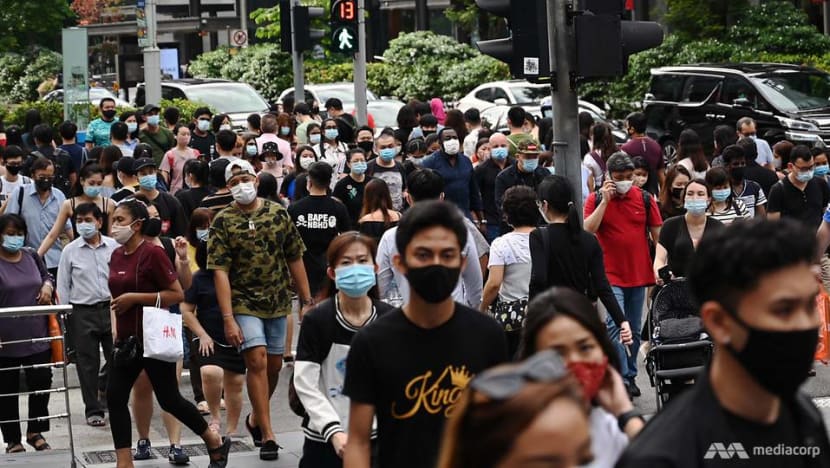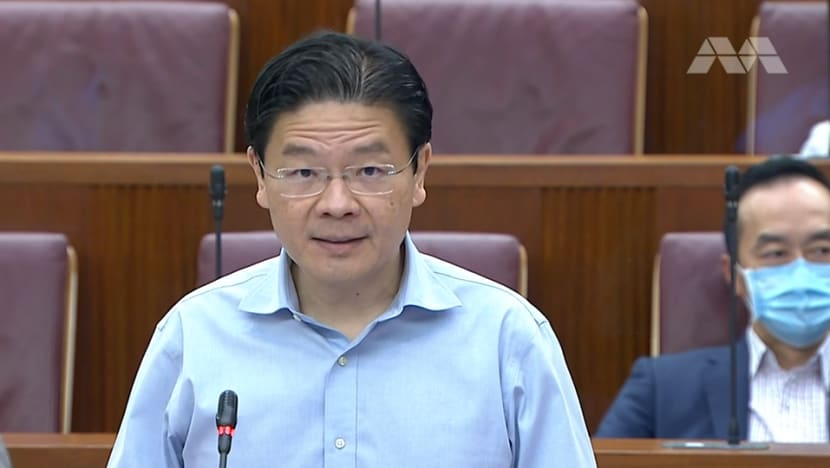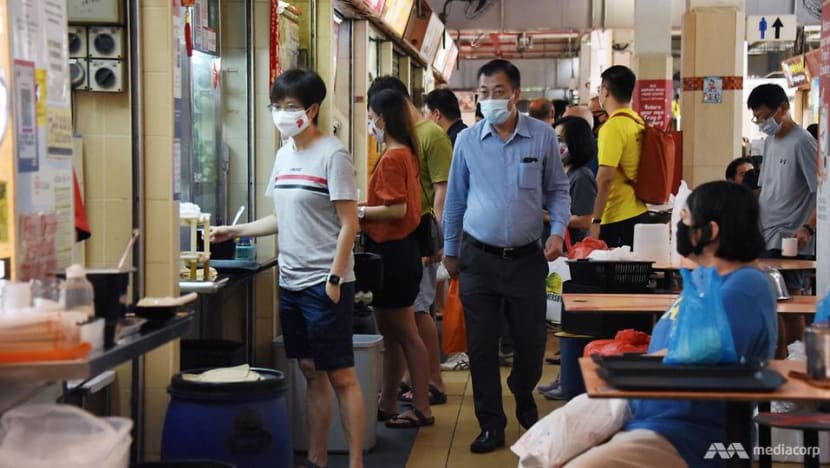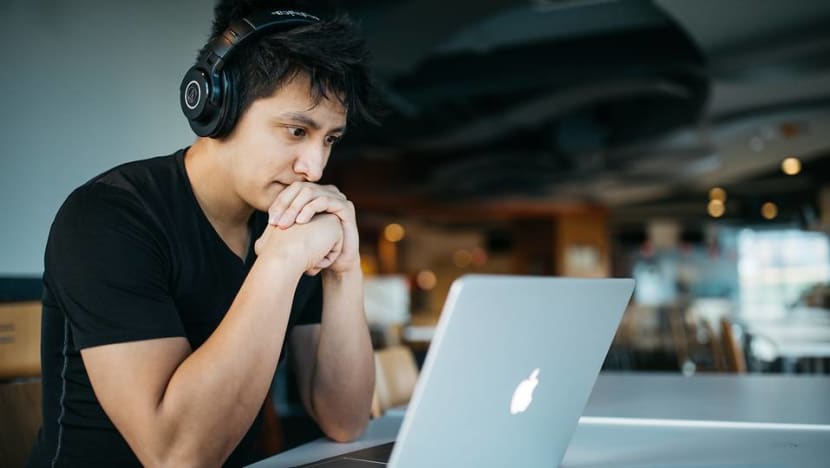commentary Commentary
Commentary: Five pandemic lessons we have learnt that should tide us over any surge in cases
Apart from maintaining good hygiene, managing our activities and preserving flexibility at work, let’s also remember to be kind and find joy in the simple things, says Vivian Teo.

Pedestrians wearing protective face masks along Orchard Road in Singapore on Sep 4, 2020. (File photo: Marcus Mark Ramos)
SINGAPORE: How the tides have turned. Only a month ago, Singapore had just relaxed its COVID-19 restrictions, allowing more to return to offices and attend events.
Crowds were thronging shopping malls and attractions. Plans were made for staycations and gatherings. Masks were more often worn revealing noses.
Call it COVID-19 fatigue, the setting in of complacency in our safety measures of mandatory mask-wearing and venue-capacity controls, we were all happy to have some semblance of normalcy as Singapore reopened.
Then on Apr 29, what a shock. The reported locally transmitted cases in Singapore leapt to 16.
After being used to zero or low single-digit daily community cases for what seemed like the longest time, we all felt unsettled. We went about our daily lives wondering if this could be a blip and if the cases might just peter out in the next few days.
They didn't.
READ: Commentary: Worries over rising COVID-19 cases are fuelling racially charged comments
READ: Commentary: Why Singapore is preparing to tap the brakes to slow COVID-19 spread
Co-chair of the multi-ministry task force Gan Kim Yong warned of the “concerning” B16172 COVID-19 variant first detected in India on Tuesday (May 11), while Lawrence Wong highlighted that Singapore was on a “knife’s edge”, with community cases going either ways, after an outbreak of clusters related to Changi Airport and Tan Tock Seng Hospital
SCALING DOWN ACTIVITIES
Earlier last week, Singapore tightened COVID-19 restrictions to return to Phase 2 after an uptick in daily new infection numbers.
When I read the announcement, I sighed and then went on to cancel a facial appointment and told friends whom I had made plans to meet up with that we ought to postpone. All my friends agreed it was the right thing to do.

My younger daughter in Primary 3, due to go for a learning journey with her school later in May, was disappointed when I told her the excursion was likely to be cancelled.
The Ministry of Education had announced from May 8, safety measures in schools will be strengthened and this included the suspension of activities in public spaces such as learning journeys.
The frustration at the turn in events was apparent on my social media. Friends lamented over having to revert to home workouts as gyms closed, keeping their kids home for the coming weekends and no more dining-out together for those with more than five in a family.
READ: Commentary: Three weeks of gym closure shouldn’t be a big deal but it is for many
READ: Commentary: COVID-19 has killed some friendships - but that’s okay
The complaints were reminiscent of when Singapore had to tighten measures last year in response to rising community cases, but the tone seem different.
We are taking it in our stride. There is an air of ”okay, this sucks but we can do this”.
Having been through the circuit breaker last year, we all know what to expect.
Whether the situation improves or deteriorates in the coming weeks, now is a good time to recap five key lessons picked up over the past year that will get us through the next little while.
READ: COVID-19 social media vigilantes: A valid or harmful way of dealing with rule breakers?
LESSON 1: PRACTISE GOOD HYGIENE
If COVID-19 has taught us only one thing, I hope we have better hygiene practices.
After constant reminders from posters, TV, radio and ubiquitous bottles of hand sanitisers, washing our hands frequently, avoiding touching our faces and staying home when one is sick ought to be ingrained in all of us.
I dream of the day when we no longer have to witness unhygienic actions like people coughing openly into the air or food handlers talking over our food.

I hope Singaporeans will be considerate enough to voluntarily wear facemasks when unwell and use serving spoons at communal meals after COVID-19 is long over.
However, I fear this may be a lofty wish. Even during the pandemic, we have already heard of people avoiding seeing doctors and going to work despite being sick.
Some are already wearing facemasks as “chin masks” away from the gaze of enforcement officers.
READ: Commentary: Does Singapore have to resort to 'slapstick and Singlish' to get public messages across?
The recent rise in COVID-19 cases in Singapore is proof of how this pandemic is still fluid. The good hygiene practices and civil-mindedness we were forced to pick up might just be what we need to prevent a worsening of the current COVID-19 situation or the next deadly pandemic.
LESSON 2: BE KIND
One thing that has surprised me this pandemic is the kindness I have seen.
People left extra tips and bought food for delivery riders, gave free treats to frontline and migrant workers, and enthusiastically supported local businesses and attractions.
The pandemic brought out a better appreciation of people and things we took for granted in our harried lives.
The kindness we have extended and experienced will go some way to get us through this tough period. After all, delivery riders are still braving weather elements to bring us our purchases. Healthcare workers are still working tirelessly at the frontlines. Migrant workers who left their homes to work in Singapore are still building our country’s infrastructure.
The feeling of “we’re all in this together” may have sparked the enthusiastic response, but let’s not allow this kindness to vanish when the COVID-19 situation no longer feels dire. As a society, we are always in this together.
How have taxi drivers coped since COVID-19 hit our shores? Two gentlemen give their honest take on how it's been going in CNA's Heart of the Matter.
LESSON 3: FIND PLEASURE IN THE SIMPLE JOYS
Pre-COVID-19, my weekends with my husband and two daughters were often spent in a rush as we packed our time with activities like birthday parties, playdates and visiting new playgrounds.
But COVID-19 forced us to slow down and stay home. We picked up new hobbies: My children learned to make stop-motion videos, my husband found time to read while I dabbled in new recipes.
I remember during the circuit break how my social media was filled with photos of beautifully-plated cuisine by friends who became masterchefs and indoor games concocted by creative parents to keep their kids occupied. I still see many friends keeping up with their new hobbies which has sparked new levels of creativity and joy.
READ: Commentary: Our muted joy over Phase 3 is the true new normal
READ: Commentary: In defence of baking bread, watching reality TV and other frivolous fads in the time of COVID-19
For me, I saw my father a lot more after he started working from home, looking over his small business. He is a man of few words but our lunches together give us the opportunity to talk about anything.
My children have also taken to asking their grandparents about their lives and childhoods a lot more over these frequent meals together.
My family still chooses to stay in and take it slow on some weekends. COVID-19 has sparked an appreciation of the simple joys in our life. We have come to realise we do not have to be out and about all the time.
LESSON 4: STAY FLEXIBLE AT WORK
Over this past year, we have made good use of technology be it for working from home, home-based learning or holding online events.

Sure, it took some getting used to initially and there were teething problems like technical glitches. But by now, so many have become adept with technology and new practices. I am genuinely impressed by how schools are using Zoom for lessons, parent-teacher meetings and assembly book talks by authors.
The move back to Phase 2 is proof that our work practices need to remain flexible, and hybrid working arrangements should become a norm.
After all, improved productivity and employee morale — be it from saving on commuting time, waking later or avoiding office distractions — are often-cited advantage to continue work-from-home arrangements.
READ: Commentary: Why employers should cover WFH expenses
READ: Commentary: It will be a waste if parents don’t keep flexible work arrangements
We also don’t know how long this pandemic will last. Being able to have people work from home when cases go up or clusters in offices emerge is a necessary option.
This pandemic might just be the opportunity for us to evolve with times and change practices for the better.
LESSON 5: DO OUR PART AS INDIVIDUALS
In the coming weeks, I intend to play my part by minimising socialising and not going out unless necessary.
I am also bracing myself for home-based learning with my kids as there is no telling if things could worsen and another round of circuit break is required.
But this time, I know my mentality will be different: We have been through this and we can get through it.
And when things truly get better, I hope the lessons we learned from this pandemic stick with us.
It could well make the difference in whether our lives can go back to normal and whether we emerge from this as a stronger country and as more resilient individuals.
READ: Commentary: Flaring tempers and public incidents – are we losing it because of COVID-19?
BOOKMARK THIS: Our comprehensive coverage of the coronavirus outbreak and its developments
Download our app or subscribe to our Telegram channel for the latest updates on the coronavirus
Vivian Teo was a financial journalist for 14 years. She is also a mother-of-two and children’s book author.















